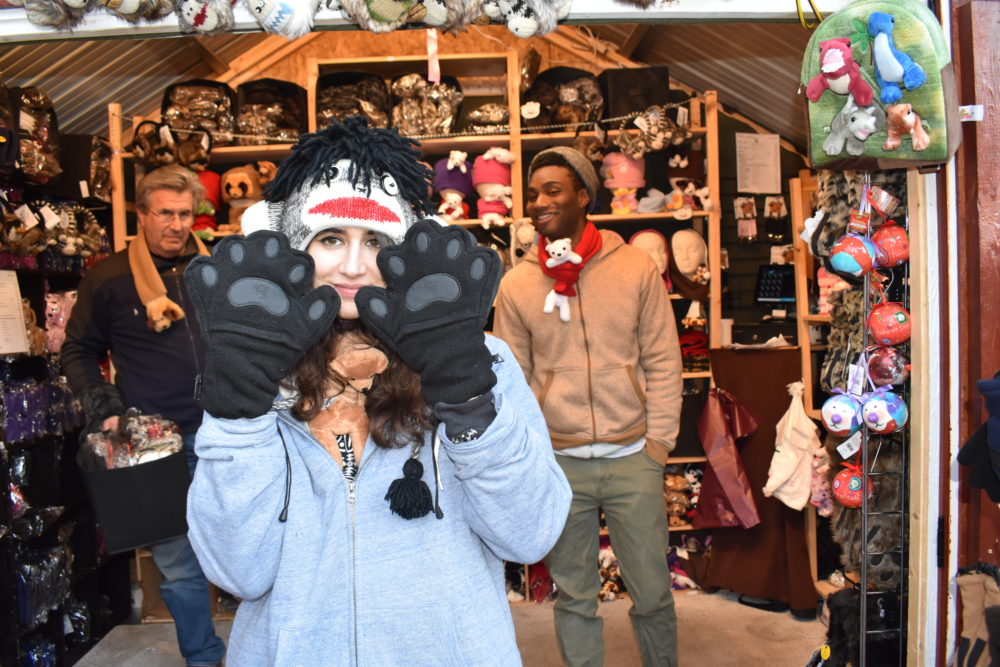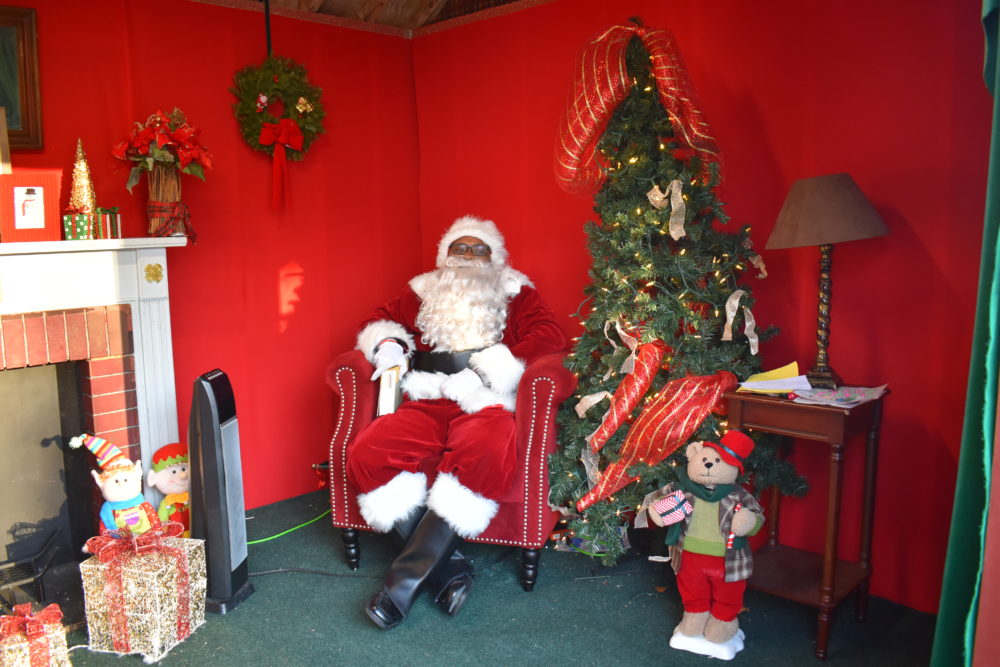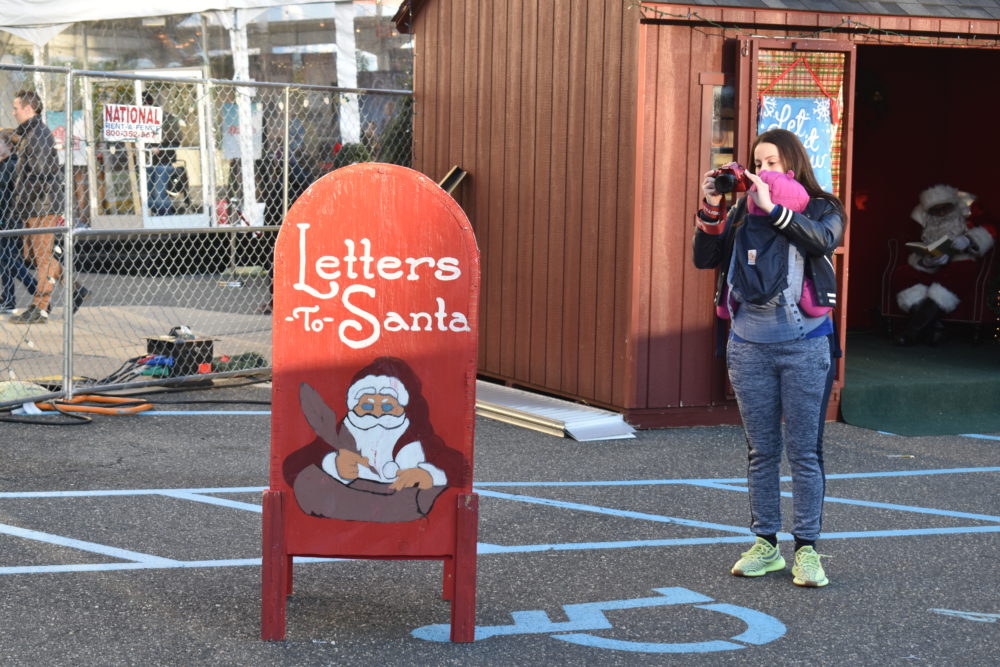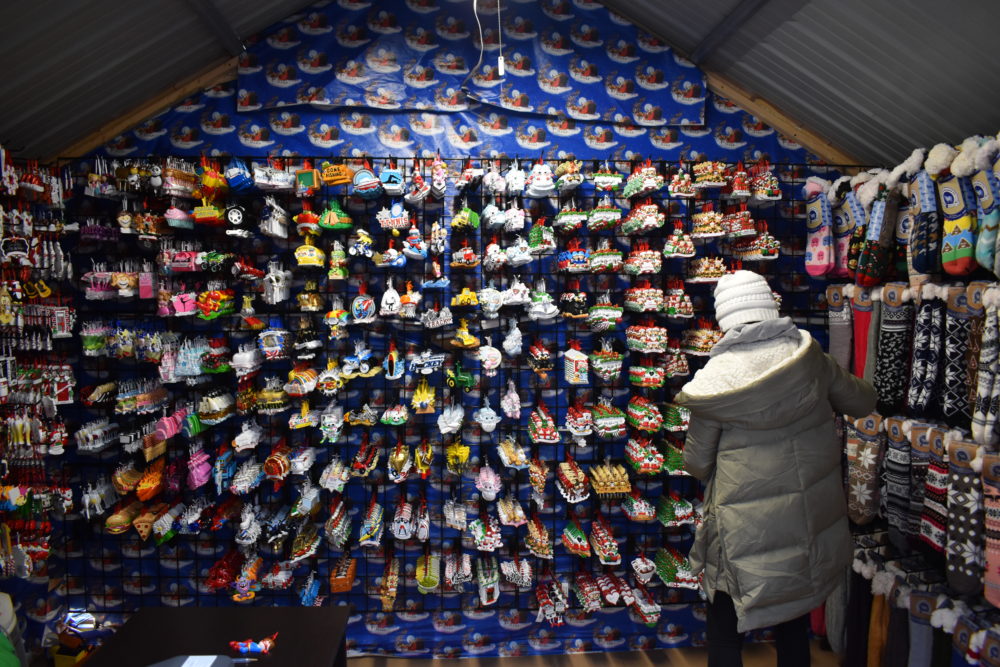Yes, there has been a Santa Claus in residence here. And a few dozen elves, in the form of eager artisans selling their wares, from cozy mittens to deep-fried pickles.
But so much else about the inaugural Winterfest at the Brooklyn Museum has been a festival of frustration, including a vocal cast of aggrieved vendors, disappointed customers, contentious organizers, and appalled supporters. Winterfest won’t be back next year, at least under current management, a spokesperson for the organizers told The Bridge.
As the event plays out its final days, it’s still worth stopping by, if only to show support for the craft-market vendors who have kept their little chalets open in spite of the recriminations. But it’s also worth asking how such a winter washout could have happened in Brooklyn, which has come to consider itself a major-league event space. A few early takes:
The Hype Was Over the Top
A press release in October declared, “With visitors coming from all over the world, Winterfest will be one of the highlights of New York’s holiday season.” The event’s website still proclaims: “A world of holiday joy and wonder awaits at Winterfest Brooklyn.”
The organizers promised a veritable theme park: a shopping village of 50 entrepreneurs, rides including a snow slide called Snowzilla, an “Enchanted Tree Maze,” musical performances, a beer garden, a wine-tasting experience, and a long list of other attractions.

Salespeople at the chalet for BearHands & Buddies, a maker of mittens, scarves and accessories (Photo by Steve Koepp)
Partners in the event predicted that Winterfest would become “a marquee holiday attraction for Brooklyn,” drawing an estimated 300,000 visitors in its first year and generating an economic benefit of $15 million for the community. The event had the backing of Brooklyn Museum, which was renting out 40,000 sq. ft. of its parking lot for the festival, as well as sponsors including Delta Air Lines.
SirRoan Smiley, proprietor of herbal-goods merchant Dropping Seeds, had been optimistic about the event. “What I came to this for,” he told The Bridge, “was to be part of what was advertised: The most extravagant Christmas event in New York City.”
All of this promised wonderment may have sounded plausible to prospective customers who’ve attended winter festivals like Manhattan’s Union Square Holiday Market and Holiday Shops at Bryant Park, which offer a sensory overload of holiday sights, sounds, and merchandise. Now it would be Brooklyn’s turn.
But those festivals are operated by Urbanspace, a company that has been putting on festivals since 1972. The company behind Brooklyn’s festival, Seasonal Activation Group, is a Boston-area firm that calls itself a “worldwide leader in seasonal entertainment,” but is evidently not in the same league.
A Soft Launch, But Full Prices
When the event opened on the day after Thanksgiving, the organizers had an ambitious plan to charge admission for some of the attractions, including package deals for family outings and romantic dates. But many of the promised attractions weren’t open yet, and others were underwhelming.
Local reporters started hearing about Winterland visitors asking for refunds and describing attractions as pathetic efforts. A Bklyner reader named Julia commented, “the immersive chocolate experience is actually a cup of instant cocoa and a Tupperware of fun size Halloween candy.”

Santa was on duty at his post, but not very busy one afternoon (Photo by Lesley Alderman)
The tree maze looked like a disorganized Christmas-tree sales lot, and an exhibit on the history of Santa Claus was mostly a series of placards. Much of the perimeter was enclosed by an ungainly chain-link fence.
Visitors who had trekked a long way to the event were especially peeved. “This is a total scam and there are many angry New Yorkers,” Hannah Kim, who traveled from Bergen County, N.J., told Gothamist. She spent $75 on tickets and another $50 on food and wine. “Being that I made my husband drive for so long to go to this event, I was utterly embarrassed,” she said, calling the festival a “ridiculous event.”
The organizers started offering refunds to disappointed customers, but some of them reported difficulty reaching anyone connected with festival management. With such a difficult start, the image of Winterfest quickly pivoted from wonderland to scam event, drawing comparisons to the infamous Fyre Festival and Brooklyn’s own notorious $75-a-head pizza festival of last year.
Vendors Left in the Cold
Yet the frustration of customers paled next to that of many vendors, who were typically charged $6,200 to rent one of the little chalets where they could sell their wares. The structures suffered power outages at first, as well as leaks that soaked some of the merchandise. A rug vendor, who asked not to be named, said he had to dry out his goods several times after rainstorms.
Other vendors complained of sparse foot traffic, blaming poor logistics and and a failure by the organizers to live up to their contractual agreements to promote the event. One vendor, asking for anonymity out of concern of reprisal from the organizers, pointed out that the large gate that leads into the festival from Eastern Parkway was kept closed for the first week, with only a small walkway for passers-by to enter. Along with lack of lighting, “no one could see we were here,” she said.

Vendors, one of whom showed The Bridge the walls and wiring of his chalet, said they suffered a power outage in addition to water leaks when it rained (Photo by Patrick Smith)
Some vendors quickly dropped out. One of them, canvas-bag maker Pamela Barsky, took her complaint to the Brooklyn District Attorney’s office. “This wasn’t just disorganized, I think they had every intention of scamming everyone,” Barsky told Brooklyn Daily. “It was like kindergartners trying to set up a show.”
Barsky said she complained about the power outage directly to Lena Romanova, CEO of the company that organized the event. “As soon as I met her I complained. She then blamed me for all the problems and later sent out a letter to all other vendors saying bad things about me,” Barsky told Bklyner.
Jennifer Crosby, a spokesperson for the event, said in an email that “Winterfest is in its first year. Like in any other event of this type, our contract doesn’t guarantee specific footfall or performance to the vendors.” Crosby stated that on weekends, foot traffic has been good and the vendors have been doing well.
Several vendors who spoke with The Bridge agreed with that assessment. Some were forgiving of the shaky start, saying their expectations were tempered, given the nature of a first-time event.
Cornelia Koller, owner of Brooklyn-based COKO Jewelry, said that the customers she encountered were mostly from the neighborhood and were excited to have such an event nearby, but said the event “wasn’t quite ready” and organizers should have been better prepared.
A Reboot Helped, to Some Degree
Management of the Brooklyn Museum, seemingly appalled by the chaos of the event’s start and the rising public-relations crisis, quickly decided to force a reorganization of the event in early December.
“We are extremely disappointed that the organizers have failed to live up to their promises and we have conveyed our concerns to them,” museum management said in a statement. “Specifically, we have demanded that they make immediate changes to the overall look and feel of the event, and we have demanded that they stop selling tickets and make all attractions free of charge.”

SirRoan Smiley, proprietor of herbal-goods merchant Dropping Seeds, said his business was nearly expelled, but is sticking around for the duration (Photo by Patrick Smith)
The event was reduced in frequency as well, switching from a six-day-a-week festival to a Thursday-Sunday schedule. “Vendors complained about closing the event two days a week when they themselves asked for it to reduce costs,” event spokesperson Crosby told The Bridge in an email. “While there was power issues the first day, those issues were taken care of and resolved.” The changes seemed to boost foot traffic, vendors said.
In a statement issued to the vendors, museum spokesperson Kate Lupo said, “This has become a very challenging issue for the Museum because the organizers have failed to live up to so many of their promises and obligations that we really don’t want to associate with them.”
The only reason the museum was allowing the market to remain open, the statement said, is out of solidarity with the vendors. The museum added that the organizers had not “paid us a dime with regard to their rental obligation.”
Alleged Hardball Tactics
While the organizers sometimes seemed conciliatory about the festival’s shortcomings, they seemed acrimonious in other cases, vendors say.
Smiley, proprietor of Dropping Seeds, who was working in conjunction with the Brooklyn healing center Minka to create what they called a “healing tea temple” at Winterfest, said they had signed on for six days a week at the festival, investing $10,000 in rent and other costs.

Customers complained that the promised attractions were missing or rather sparse in their presentation (Photo by Lesley Alderman)
When the event was cut down to four days a week, however, he had “not even had a conversation” about getting a refund for the days they were promised, but suddenly received an email saying his contract would be terminated and he needed to vacate his stand or face “forced removal” if he didn’t comply.
A follow-up email from the organizers reversed the expulsion at “the request of other vendors,” but noted that Smiley—by speaking to the press about conditions at the market—had violated a clause in the rental contract and that this would be a “final warning.”

Some vendors, like this holiday-ornament shop, had trucked in large amounts of inventory to sell (Photo by Steve Koepp)
Asked about the alleged hardball tactics, Winterfest spokesperson Crosby responded: “Other vendors understand the difficulties of a first year event and that they are outside of our control. They are as disappointed as we are but they don’t go around making false and negative statement(s) to harm the event.”
Crosby alleged that several vendors spoke to the press with the purpose of sabotaging the event in hopes of getting public opinion on their side so they could get a refund from the organizers.
An Organizer With a History
Seasonal Activation Group has offices in Newton, Mass., Las Vegas, London, and Riga, Latvia, according to its website. CEO Romanova is originally from Latvia and told Bklyner that her family has been hosting holiday markets in Eastern Europe for nine years. After the shaky start in Brooklyn, she promised to make changes. “I want to make people happy,” she said. “We want it to be a memorable experience.”
Yet the firm has had at least one similarly contentious episode in the past. Seasonal Activation Group is associated with Millennial Entertainment, which since 2016 has operated a festival called Boston Winter, with more than 100 vendors. Vendors at that event complained to the Boston Globe about weak turnout, a poor physical layout, and closed concession stands.
Tucker Gaccione, owner of Boston-based The Happy Cactus, who shared a chalet at the 2017 market with two other vendors, echoed those complaints as well as what he saw as Millennial Entertainment’s adversarial way of responding to problems. Gaccione said he had “never done a market so poorly operated, that treated small business owners so badly.”

The vendor Afrodesiac Worldwide, which sells African-made goods, was one of those who stuck with the festival despite its problems (Photo by Steve Koepp)
The company that manages the seasonal festivities at Boston’s City Hall Plaza—Boston Garden Development Corp.—filed a lawsuit early this year to terminate its three-year contract with Millennial Entertainment, claiming that it’s still owed $235,000 from the first year of the agreement. Millennial, for its part, said it was ending the agreement by its own choice because Boston Garden had failed to honor terms of the contract.
The Festival’s Last Chapter
At the Brooklyn event, some vendors have kept their chalets open for business, looking forward to mild weather over the weekend, although one said that many out-of-town vendors had already packed up and shipped out. The festival will continue through next Monday, Dec. 31, according to spokesperson Crosby.
The Brooklyn Museum continued to promote the show on social media, which vendors said they appreciated, though recent posts pointedly avoided the term “Winterfest.”
And while the organizers said they’re not coming back next year, they’re not done with Brooklyn yet. “Winterfest retained legal counsel to initiate litigation and seek full recovery against parties who engaged in defamatory statements and posted anonymous stories across the web,” spokesperson Crosby told The Bridge. “More details will be announced shortly.”